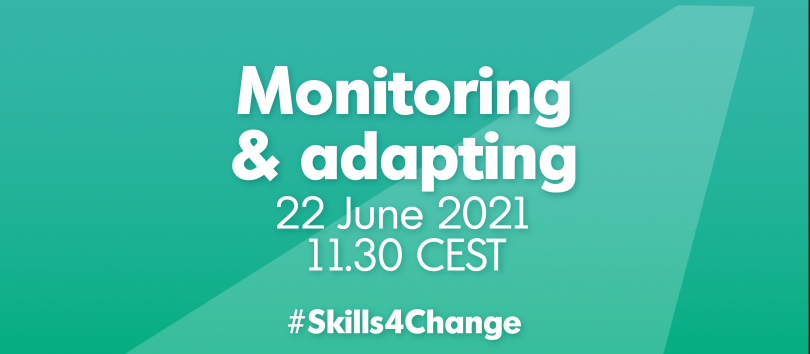
A glance ahead at conference session 4: Monitoring and adapting
The need to constantly adapt education and training is undisputed. The demand for skills warps at neck-breaking speed in our world of globalisation, digitalisation, automation, greening and, most recently, a pandemic. But how can we be sure that we are changing education in the right direction?
This will be the topic of debate in the thematic session ‘Monitoring and adapting’ of the ETF 2021 international conference ‘Building lifelong learning systems: skills for green and inclusive societies in the digital era online’.
“We have to ensure that we are always moving education reforms in the right direction,” says Mihaylo Milovanovitch, the ETF senior specialist in VET policies and systems who will lead the session.
“Monitoring needs to gather the evidence that plots our course but it also, importantly, must help us ensure that others believe we are on the right track. There are a lot of stakeholders that must be convinced that what we do is right: employers, students, teachers, parents… you name them. We cannot convince everyone by just announcing that we know what we are doing. We need to convince them with arguments and evidence.”
“The focus of monitoring is on describing progress, so it draws on past periods. However the purpose is forward-looking: it delivers evidence that informs improvement for the future.”
Some countries invest in monitoring primarily to control the day-to-day operation of their education and training systems. Others do it for the more specific purpose of tracking various reforms in support of system change. The results of these efforts often go well beyond VET and may feed into international data repositories, such as the UNESCO UIS database, the World Bank’s WDI database, or the OECD’s PISA database.
Nevertheless, each country has its own reform trajectory, needs, context-specific challenges, and solutions for monitoring change. These experiences allow us to take stock of what works in monitoring reforms, but also what is missing and needs attention, especially when it comes to creating opportunities for lifelong learning.
The great challenge, of course, is that there is always a delay between the origin of data for monitoring and the resulting action. In our time, a gap of just a few years can be too much.
On the plus side, this challenge is universal, which means that countries can learn from each other. This makes the platform that the ETF can offer, in part through an event such as this, so valuable.
The session will revolve around three central questions:
- What do we need to monitor?
We will discuss how we can ensure that the goals against which we are monitoring progress are properly captured by the monitoring system. We will also look at how we can define indicators of success that are shared and accepted by all actors and stakeholders.
- How do we monitor?
The session aims to provoke a discussion about the process and methodology of monitoring. Should a monitoring process include many stakeholders to ensure the results are accepted? How can monitoring systems be flexible without jeopardising their integrity and reliability or the continuity of ongoing evidence generation efforts? How can different evidence collection methods and types of evidence be aligned and compared, also nationally and internationally?
- How do we use the monitoring results?
Even the best monitoring system would be inadequate if its results were not used to inform decisions, guide improvement, and inspire further change. How can we ensure that the evidence delivered by monitoring is actually applied? Can the design of the monitoring system promote or hinder the meaningful use of results, and what is the role of proper communication in this?
Covid-19 has unfortunately made it impossible to meet in person for the conference. But the challenges of the pandemic also offer unique opportunities: for the first time ever, the thematic sessions at an ETF conference will be open to literally everyone in the world with internet access.
“While the debates will be limited to a core group of around ten people, everyone can attend and we really hope that as many as possible will,” says Mihaylo Milovanovitch who particularly hopes to attract groups of stakeholders that have been more difficult to reach through the traditional event format, all the way from the practitioners who have to deliver the data for monitoring to international partners who fund interventions and influence the policy agendas.
The conference takes place from 21 to 25 June 2021. It is organised by the ETF and UNESCO in collaboration with UNICEF. The thematic session on monitoring is scheduled for 22 June from 11.30 to 13.30 CET.
Did you like this article? If you would like to be notified when new content like this is published, subscribe to receive our email alerts.